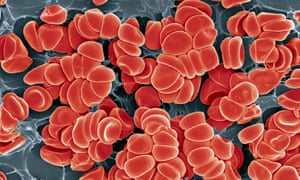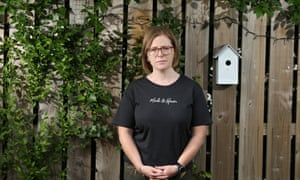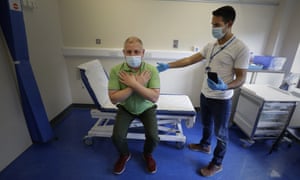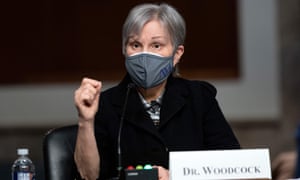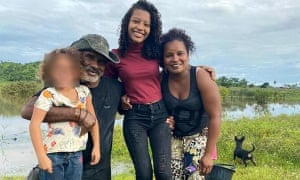The medical community must find answers for those suffering from long Covid. They are running out of time and hope.
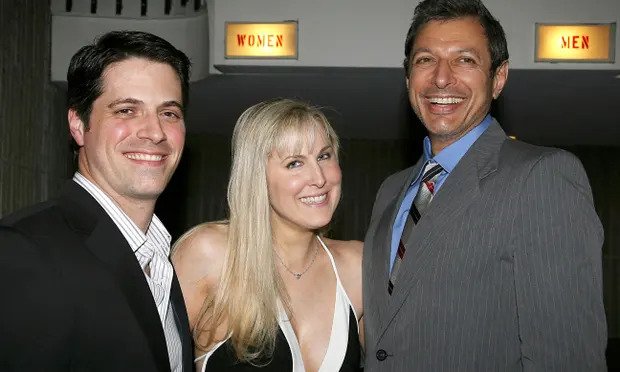 Seen here with her husband Nick Güthe and the actor Jeff Goldblum, Heidi Ferrer was a screenwriter who worked on shows including Dawson’s Creek. Photograph: Dave Allocca/Starpix/Rex/Shutterstock
Seen here with her husband Nick Güthe and the actor Jeff Goldblum, Heidi Ferrer was a screenwriter who worked on shows including Dawson’s Creek. Photograph: Dave Allocca/Starpix/Rex/Shutterstock
–
Last modified on 2022 Jan 12
–
My wife, Heidi, took her own life after a 13-month battle with long Covid that started as a mostly asymptomatic coronavirus infection. Long Covid took her from one of the healthiest, most vibrant people I’ve ever known to a person so debilitated that she could not bear another day on this planet.
I came home one day last May to find that she’d decided to end her pain. As our 13-year-old son waited outside for the paramedics, I tried desperately to revive her. I did a good enough job that by the time we got her to the hospital they could restart her heart, but she was brain dead on arrival. The emergency room doctor assumed that she died from depression. When I told him, “She wasn’t depressed, it was long Covid,” he looked at me with bewilderment and asked, “What’s long Covid?”
Late last night I got a desperate Twitter message from a man whose wife could be the next Heidi. She has long Covid and was threatening to end her life. She had already told their eight-year-old daughter her plan. I called him immediately. Heidi and his wife both suffered from unexplained neurological tremors and internal chest cavity vibrations so bad they lost the ability to sleep.
Like prisoners of war kept awake for days as a method of torture, their minds lost the ability to make sound cognitive decisions. I knew this man’s terror. Sadly, his call was not an anomaly. I have answered requests like his every single day since my wife’s obituary went viral and I began to share our story with the media.
My wife, Heidi Ferrer, was a screenwriter with a history of social advocacy and an empathetic heart. She was talented, beautiful and the most dedicated mother you ever met; we often referred to her as “sunshine in a dress”. She defeated a decade-long battle with alcoholism only to find an adversary in long Covid that was far more insidious. Three weeks before she died, we were already terrified that she would die – not by her own hand, but from a stroke or a heart attack. She said her heart would often race out of control for no reason, and she was ahead of scientists in understanding that this virus also infects the brain.
Heidi also suffered from ongoing gastrointestinal issues, exhaustion from just walking up a single flight of stairs, extreme body aches, brain fog and a host of other ailments. All of this – with no hope on the horizon of any cure let alone acknowledgment from the medical world – brought her to the place where she asked me that, if something happened to her, I would tell the world what long Covid is. I made this promise never thinking I would actually have to act on it – never imagining that only three weeks later I would come home to find that she had decided death was preferable to another minute in her own personal hell.
Watching long Covid systematically take her apart, organ system by organ system, was the most terrifying deterioration of a human being I have ever witnessed. My wife was an avid 90-minute-a-day walker, ate only organic (and mostly vegan) food, and hadn’t had an alcoholic drink in three and half years. Within six weeks of noticing “Covid toes” and some gastrointestinal issues she could barely walk from excruciating nerve pain in her feet so extreme as to mimic advanced diabetic neuropathy.
Long Covid doesn’t come for you all at once; instead, with methodical precision, it slowly robs you. Heidi lost her mobility and her ability to eat. She was a lifelong avid reader but the brain fog (better thought of as cognitive dysfunction) robbed her of the ability to retain information. Even urinating and eventually, and cruelly, sex became painful. Long Covid seemed to steal every part of her life that made it worth living.
After Heidi’s obituary went viral, I connected with Survivor Corps, the world’s largest long Covid advocacy group. They asked if I would be willing to tell Heidi’s story on a broad scale. Recalling my promise to Heidi, I agreed. As I shared her story, my Facebook and Twitter inboxes began filling up with messages from long Covid sufferers around the world. They were in horrible pain yet felt gaslit by their doctors. They described the same tremors and vibrations that tortured Heidi. As with Heidi, no one believed them. My girl was the canary in the coalmine.
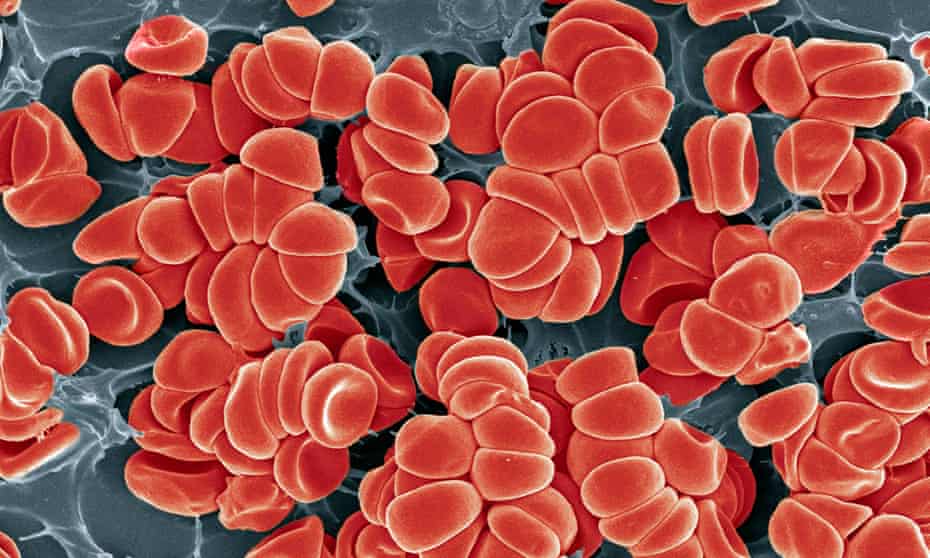
Could microclots help explain the mystery of long Covid?
Sadly, seven months later the global medical community has done little to accelerate research into these terrifying symptoms. I suspect that the risk of long Covid-related suicides will only increase. We will never have an accurate count of global infections, but preliminary research suggests that at least one in three people who get Covid will develop long Covid symptoms. If only one in 20 of those long Covid patients becomes disabled or seriously debilitated we could be looking at a disturbing increase in suicides worldwide.
Suicide is not like death from natural causes or even a ghastly accident. It is planned and its psychological shrapnel wounds for generations. None of us – not me, my son, Heidi’s family and friends – will ever be the same. I am not trying to be an alarmist, but we are in a true crisis. The global medical community must band together to find answers for those suffering. They are all Heidi and they are running out of time and hope.
–
- Nick Güthe is a writer/director/producer and a senior adviser to Survivor Corps
- In the US, the National Suicide Prevention Lifeline is at 800-273-8255 and online chat is also available. You can also text HOME to 741741 to connect with a crisis text line counselor. In the UK and Ireland, Samaritans can be contacted on 116 123 or email jo@samaritans.org or jo@samaritans.ie. In Australia, the crisis support service Lifeline is 13 11 14. Other international helplines can be found at www.befrienders.org
–
–










